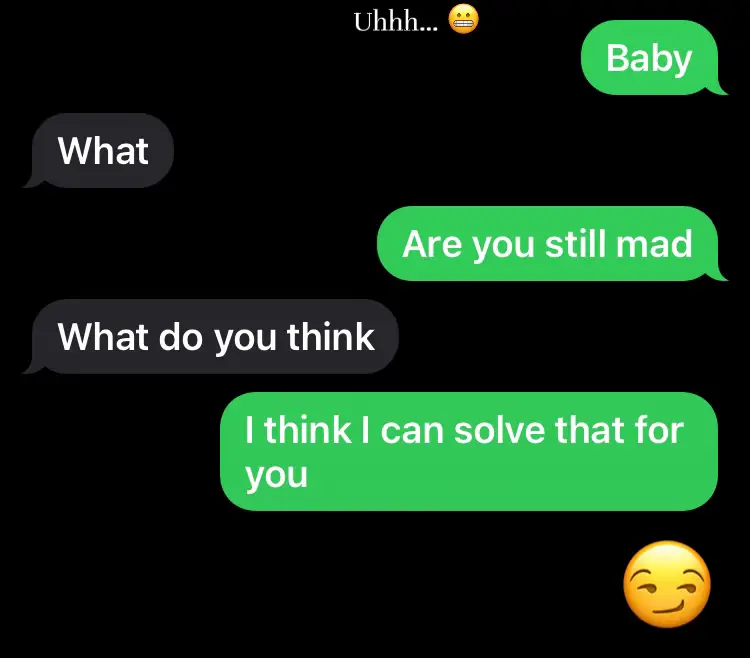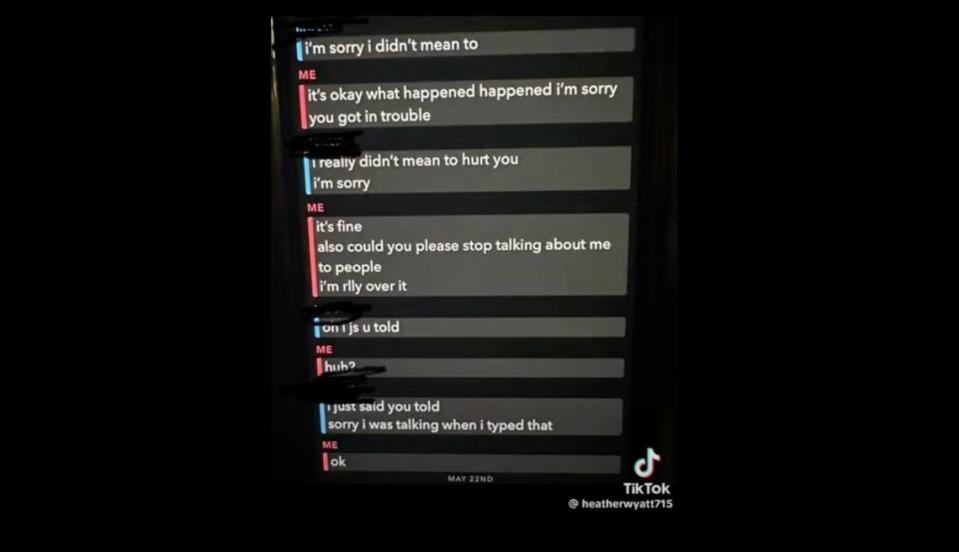Aubreigh Wyatt's Texts: Details Of Bullying & Aftermath
In a world increasingly dominated by digital communication, can a series of text messages truly reveal the depths of a tragedy and ignite a national conversation? The story of Aubreigh Wyatt, a young cheerleader from Mississippi, and the messages she exchanged before her untimely death, serves as a chilling reminder of the pervasive impact of cyberbullying and the enduring power of words.
The narrative unfolds in the wake of Aubreigh's death, a tragedy that has sent ripples through her community and beyond. Her mother, Heather Wyatt, has become a vocal advocate, bravely sharing Aubreigh's story and the digital breadcrumbs that led to her despair. These breadcrumbs, in the form of text messages, have become a focal point of interest, offering a glimpse into Aubreigh's inner world, her struggles, and the relentless barrage of cyberbullying she endured. These messages, along with the circumstances surrounding her death, have prompted legal action, sparked a social media firestorm, and forced a reckoning with the dark side of the digital age.
| Attribute | Details |
|---|---|
| Full Name | Aubreigh Wyatt |
| Age at Death | 13 years old |
| Nationality | American |
| Known For | Cheerleader, victim of cyberbullying |
| Cause of Death | Suicide |
| Location | Ocean Springs, Mississippi |
| Mother | Heather Wyatt |
| Advocacy | Raising awareness about cyberbullying and mental health |
| Foundation | The Aubreigh Wyatt Foundation |
| Social Media Impact | Her story gained national attention and sparked conversations about bullying. |
| Legal Action | Lawsuit against social media and those allegedly involved in bullying. |
| Date of Death | September 2023 |
| Reference Link | Your Source |
The texts themselves, shared by Heather Wyatt, paint a picture of relentless harassment. The messages, exchanged over several months, contained threats of violence, sexual assault, and even death. The details are difficult to read, showcasing the brutal impact of online cruelty. The digital realm, which promised connection and community, became a weaponized space where anonymity emboldened bullies and eroded Aubreigh's sense of self. These texts were not mere words; they were a relentless assault on her well-being.
The aftermath of Aubreigh's death has been marked by a complex web of legal battles, social media outrage, and a desperate search for answers. The parents of the teens allegedly involved in the bullying have been targeted with a lawsuit filed by Heather Wyatt, seeking justice for her daughter. The legal proceedings will likely delve into the intricacies of the text messages, examining their content, context, and potential impact. The legal strategy may involve expert witnesses, forensic analysis of digital devices, and a thorough investigation of the school's response to the reported bullying.
Adding to the complexity, the story has been shared extensively on social media platforms, with the aim of raising awareness about the devastating impact of bullying. Heather Wyatt's posts about the situation have been widely viewed and shared, generating an outpouring of support and empathy, but also attracting criticism. The social media landscape became a space for sharing stories, expressing grief, and building a network of support, with hashtags like #Livelikeaubreigh and #LLa gaining traction. The social media response, while powerful, has also added to the emotional intensity of the situation and highlighted the challenges of navigating grief and trauma in the digital age.
The case of Aubreigh Wyatt serves as a stark reminder of the prevalence of cyberbullying in the lives of young people. Cyberbullying knows no boundaries, extending beyond school hours and physical spaces. It can occur on any platform, from social media networks to text messaging apps. The anonymity afforded by the internet can embolden bullies, leading to a rise in online harassment and abuse. Furthermore, the constant connectivity provided by smartphones and other digital devices intensifies the effects of cyberbullying, as targets often experience the torment around the clock.
The case also illuminates the devastating impact that cyberbullying can have on mental health. The barrage of negative messages, rumors, and threats can lead to feelings of worthlessness, isolation, and despair. The constant online negativity can damage self-esteem, causing depression, anxiety, and even suicidal thoughts. The connection between cyberbullying and mental health issues cannot be overstated. As a direct result of the harassment, Aubreigh felt worthless and suicidal. This tragically underscores the necessity of addressing the emotional and psychological harm that cyberbullying causes.
The legal ramifications extend beyond the alleged bullies. The case is also a spotlight on the role of social media platforms in facilitating and potentially enabling cyberbullying. The lawsuit against social media raises the critical question of whether these platforms have a responsibility to prevent or moderate harmful content. The platforms have become a target of scrutiny for failing to promptly remove abusive content or to protect vulnerable users. The outcome of these legal actions could have far-reaching consequences, shaping how social media platforms are regulated and how they respond to cyberbullying in the future.
The story also sheds light on the importance of preventing cyberbullying. Awareness programs in schools, parental involvement, and stricter guidelines for social media platforms are essential tools in tackling this problem. Schools should implement anti-bullying policies and offer counseling and support to students who are victims. Parents should monitor their children's online activity, educate them about cyberbullying, and foster open communication about their experiences. Social media platforms should develop robust moderation tools and enforce stricter rules to prevent the spread of hateful content. In order to combat cyberbullying and protect vulnerable youth, a combined effort is necessary involving schools, families, and social media companies.
The emergence of text messages in this case offers a compelling example of how these digital records can be used as crucial evidence in legal proceedings. Text messages provide unique insights into the events of the case, giving a direct view into the thoughts, emotions, and experiences of those involved. They can be used to establish a timeline of events, to prove intent, and to demonstrate the impact of the alleged bullying on Aubreigh's mental state. Their use has the potential to aid the search for truth and justice, providing clarity and context in this complex and sensitive situation.
In one of the text message exchanges, a message appeared to be from someone apologizing to Aubreigh. "I really didn't mean to hurt you, I'm sorry," read the message, which demonstrated remorse from an alleged perpetrator. Aubreigh also responded with an apology for getting the other girl in trouble. These messages showcase the complexity of the social dynamics and the emotional turmoil at the center of the case.
The reactions to Aubreigh's death are a microcosm of societal responses to tragedies. The outpouring of support on social media, the public displays of grief, and the legal battles that followed highlight the deep emotional investment in the case. The formation of the Aubreigh Wyatt Foundation is an indication of the community's commitment to prevent similar tragedies. This organization aims to increase awareness and provide resources to address cyberbullying and mental health concerns.
The story has resonated with those who have experienced similar situations. Aubreigh's story is a universal one of vulnerability, resilience, and the devastating consequences of unchecked online abuse. Her story serves as a symbol of the devastating impact of cyberbullying.
The text messages that Aubreigh sent have given the family hope and offer insights into her personality, challenges, and social media impact. These messages help to show the resilience of Aubreigh in the face of adversity and the importance of support and understanding. These messages are a powerful reminder of the need to address bullying.
The fact that Aubreigh was popular despite the bullying is a reflection of her strong spirit and the complex nature of social dynamics. The fact that rumors spread despite her popularity underscores the potential for harm caused by cyberbullying. This is a testament to the fact that even the most popular individuals are vulnerable to online harassment.
The case of Aubreigh Wyatt will remain a topic of discussion for some time. It is a somber but important reminder that words have meaning. These messages provide insight into events, a snapshot of a young life cut short by the torment of cyberbullying. The legacy is a call to action, pushing us to create a world that is safer and more supportive for young people. The story of Aubreigh Wyatt and the text messages she sent will continue to spark important conversations about cyberbullying, mental health, and the ethical responsibility that we all share in the digital age.



Detail Author:
- Name : Miss Melyssa Hegmann Sr.
- Username : otho03
- Email : kody34@yahoo.com
- Birthdate : 1981-09-09
- Address : 744 Lang Place Jeramiemouth, MN 96264
- Phone : +1.562.316.0336
- Company : Feeney, Walker and Kessler
- Job : Copy Machine Operator
- Bio : Exercitationem ipsum laboriosam aut aut aperiam odio incidunt. Quisquam at deleniti hic quis. Culpa quis omnis delectus aliquid. Numquam doloribus ad doloremque non deserunt possimus odit.
Socials
linkedin:
- url : https://linkedin.com/in/bartonl
- username : bartonl
- bio : Saepe aspernatur reprehenderit commodi.
- followers : 1136
- following : 2241
facebook:
- url : https://facebook.com/lessie.barton
- username : lessie.barton
- bio : Quo nihil modi modi recusandae autem suscipit fuga.
- followers : 1270
- following : 729
tiktok:
- url : https://tiktok.com/@lessie_barton
- username : lessie_barton
- bio : Tempore quidem rem eos sapiente. Modi ea sit nisi enim.
- followers : 1194
- following : 2299